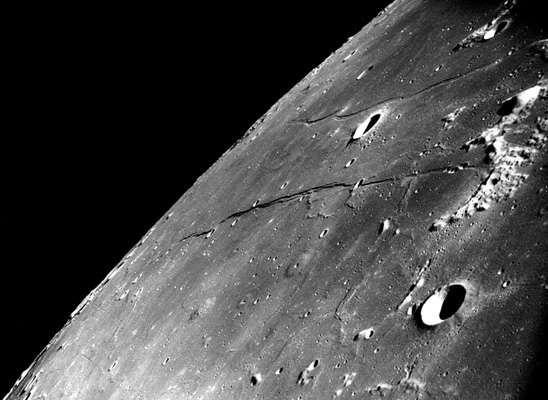Difference between revisions of "January 2, 2004"
| Line 1: | Line 1: | ||
__NOTOC__ | __NOTOC__ | ||
=Cauchy Faults, Rilles and Domes= | =Cauchy Faults, Rilles and Domes= | ||
| + | <!-- Start of content --> | ||
<table width="85%" border="0" align="center" cellpadding="4" cellspacing="2"> | <table width="85%" border="0" align="center" cellpadding="4" cellspacing="2"> | ||
<tr> | <tr> | ||
| Line 49: | Line 50: | ||
<!-- Cleanup of credits --> | <!-- Cleanup of credits --> | ||
<p> </p> | <p> </p> | ||
| + | <!-- End of content --> | ||
{{wiki/ArticleFooter}} | {{wiki/ArticleFooter}} | ||
Latest revision as of 18:09, 7 February 2015
Cauchy Faults, Rilles and Domes
|
Cauchy Faults, Rilles and Domes Some of the most dramatic images ever obtained of a planetary landscape are the oblique views taken by Apollo astronauts using handheld Hasselblad cameras. This great view was taken by the Apollo 8 astronauts, who made the first flight around Moon in December 1968. Looking NW across eastern Mare Tranquillitatis, the astronauts captured an oblique view of the roughly parallel fault and rille north and south of the 12 km wide crater Cauchy. Surprisingly, there seem to be no determinations of the height of the 120-km long fault, which I guess is 200-300 m high. The 210-km long rille is a steep-walled graben - i.e. the mare surface dropped down between two parallel faults. South of the fault are two domes - probable small volcanoes formed by lava flows from a central vent. Cauchy Omega is a smooth and somewhat flat-surfaced dome with a central crater. If there are any volcanic craters on the Moon - this is one of them! The dome Cauchy Tau appears steeper and rougher surfaced and lacks a vent crater. Related Links:
Yesterday's LPOD: First Quarter Moon Tomorrow's LPOD: Colorful Aristarchus Plateau |
Author & Editor:
Charles A. Wood
COMMENTS?
Register, Log in, and join in the comments.




